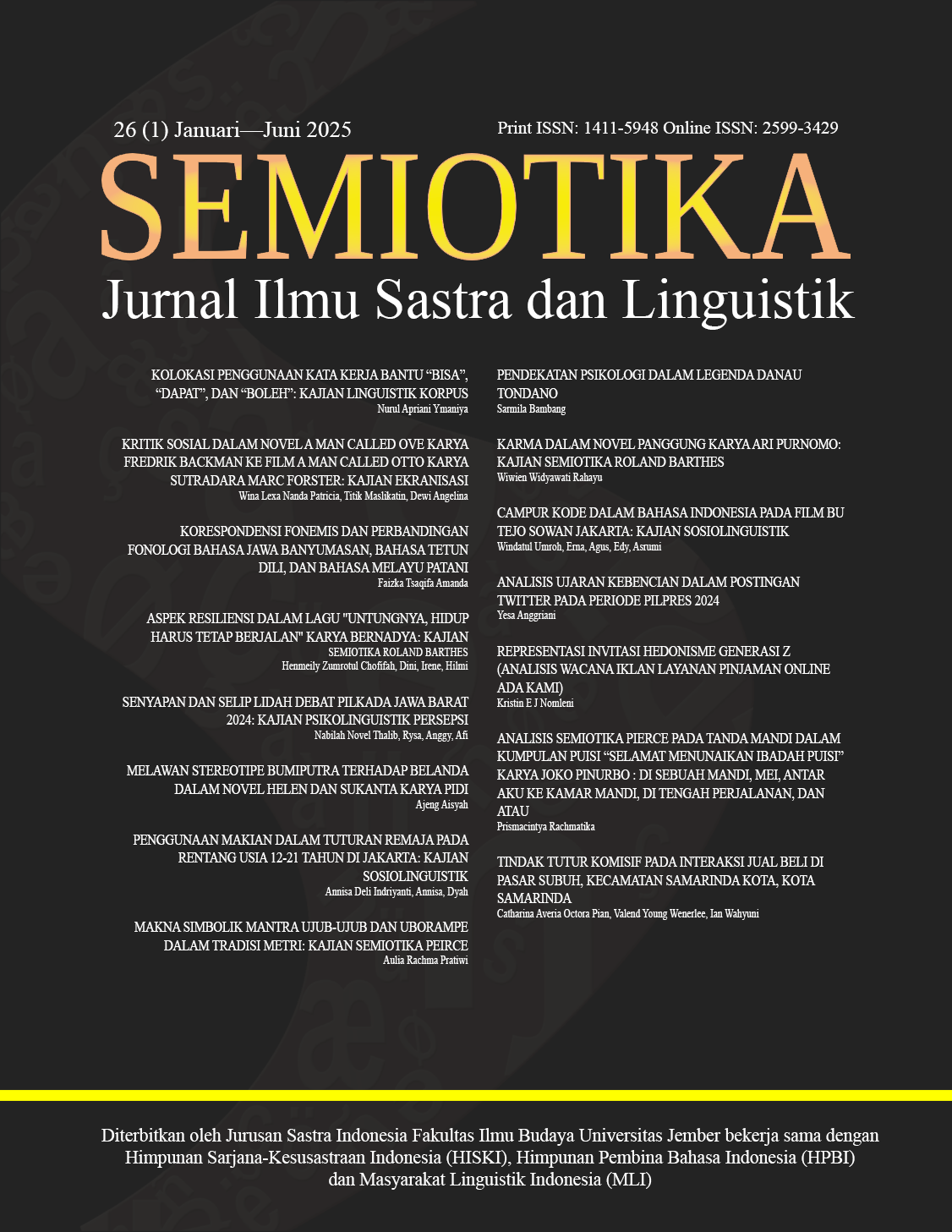PENGGUNAAN MAKIAN DALAM TUTURAN REMAJA PADA RENTANG USIA 12-21 TAHUN DI JAKARTA: KAJIAN SOSIOLINGUISTIK
Keywords:
Cursing, Teenegers, Sociolinguistic, SpeechAbstract
Language is the main sound symbol used by humans as a means of communication in everyday life. The use of language and word variety as a communication tool can vary depending on several factors. One of these factors is a person's age range. One of these age groups is adolescence. In the teenage years, many teenagers use curses when they are speaking. In the case of teenagers, the swearing they utter can occur in two ways, namely as a curse or as a joke. Thus, this study will examine and analyze cursing in the speech of teenagers in the age range of 12-21 years old in Jakarta. This research will use sociolinguistic approach and data collection technique through a survey with 40 respondents with the criteria of 12-21 years old and domiciled in Jakarta. The results show that adolescents aged 12-21 years old use curses in the form of animal words, dirty words, and other forms of words when they speak with their peers. The use of cursing in adolescents is usually caused by influences from their environment, such as education, family, social media, etc.
Downloads
References
Balqis, H.A., Anggoro, S.D.A., Irawatie, A. 2023. Bahasa Gaul “Jaksel” Sebagai Eksistensi Di Kalangan Remaja Jakarta. Jurnal IKRAITH-HUMANIORA. Vol. 7(1):24-32.
Chaer, A. dan Agustina, L. 2014. Sosiolinguistik: Perkenalan Awal. Jakarta: PT Rineka Cipta.
Dynel, M. 2012. Swearing methodologically: The (im)politeness of expletives in anonymous commentaries on YouTube. Journal of English Studies, 10, 25–50. https://doi.org/10.18172/jes.180
Holmes, J. 2013. An Introduction to Sociolinguistics (4th ed.). New York: Routledge.
Hudson, R.A. 2011. An Introduction to Sociolinguistics. Cambridge: Cambridge University Press.
Kementerian Pendidikan dan Kebudayaan Republik Indonesia (Kemendikbud). 2020. Karakteristik Tuturan Berdasarkan Kelompok Usia. Diakses dari https://bahasa.kemdikbud.go.id
Manurung, R., Dardanila, D., & Sembiring, S. B. 2023. Makian dalam Bahasa Batak Toba Kajian Sosiolinguistik. Jurnal Pendidikan Tambusai, 7(3), 31624-31638.
Nastiti, F.F., Sariono, A. dan Asrumi. 2019. Forms of Swear Word Expression in Basa Suroboyoan (Surabayan Javanese) Based on Its Lingual Units and References. International Journal of Scientific Development and Research (IJSDR). Vol. 4(2):105-111.
Nugroho, F.I. and Widodo, P. 2019. Makian Bahasa Jerman Dalam Film Fack Ju Göhte Karya Bora Dagtekin Dan Padanannya Dalam Bahasa Indonesia. (Doctoral dissertation, Thesis. Universitas Negeri Yogyakarta).
Pasaribu, Y., & Siregar, H. T. 2023. Fenomena Bahasa Gaul “Jaksel” di Kalangan Remaja SMA Negeri 11 Medan. KESKAP: Jurnal Kesejahteraan Sosial, Komunikasi dan Administrasi Publik, 6(1):104–114. https://jurnal.umsu.ac.id/index.php/keskap/article/ view/14483.
Sariono, A. 2008. Makrolinguistik: Dialektologi dan Sosiolinguistik. Jurnal Medan bahasa, Vol. 3(2):211-225.
Sariono, A. 2020. Pemilihan Bahasa dalam Masyarakat Using. Yogyakarta: Grandia Publisher.
Sitompul, A.W., Ginting, C.H., Sihite, T.D.S., & Harahap, S.H. 2024. Kajian Sosiolinguistik terhadap Tuturan Makian Masyarakat Heterogen di Medan. El-Mujtama: Jurnal Pengabdian Masyarakat, 4(5), 2174-2186.
Sugiyono. 2013. Metode Penelitian Pendidikan: Pendekatan Kuantitatif, Kualitatif, dan R&D. Bandung: Alfabeda.
Wardhaugh, R., & Fuller, J. M. 2015. An Introduction to Sociolinguistics (7th ed.). Malden, USA: Wiley-Blackwell.
Wibowo, A. 2023. Analisis Interaksi Simbolik Umpatan Pada Pemain Game Online Mobile Legends: Bang-Bang. (Fakultas Ilmu Sosial dan Politik, Universitas Lampung)
Wibowo, R.M. 2020. Leksikon Makian Dalam Pertuturan Bahasa Indonesia: Kajian Sosiolinguistik. Semiotika: Jurnal Ilmu Sastra dan Linguistik. Vol. 21(2).
Wijana, I. D. P. 2019. Makian sebagai Strategi Stilistika dalam Bahasa Indonesia: Kajian Pragmatik dan Sosiolinguistik. Jurnal Linguistik Indonesia, 37(1), 15–28. https://doi.org/10.26499/jli.v37i1.205
Wijaya, I.D.P. dan Rohmadi, M. 2007. Sosiolinguistik: Kajian Teori dan Analisis. Yogyakarta: Pustaka Pelajar.
Downloads
Published
Issue
Section
License
Copyright (c) 2025 Semiotika: Jurnal Ilmu Sastra dan Linguistik

This work is licensed under a Creative Commons Attribution-ShareAlike 4.0 International License.
SEMIOTIKA has CC-BY-SA or an equivalent license as the optimal license for the publication, distribution, use, and reuse of scholarly work. Authors who publish with this journal retain copyright and grant the journal right of first publication with the work simultaneously licensed under a Creative Commons Attribution-ShareAlike 4.0 International License that allows others to share the work with an acknowledgment of the work's authorship and initial publication in this journal.
Attribution-ShareAlike
CC BY-SA


